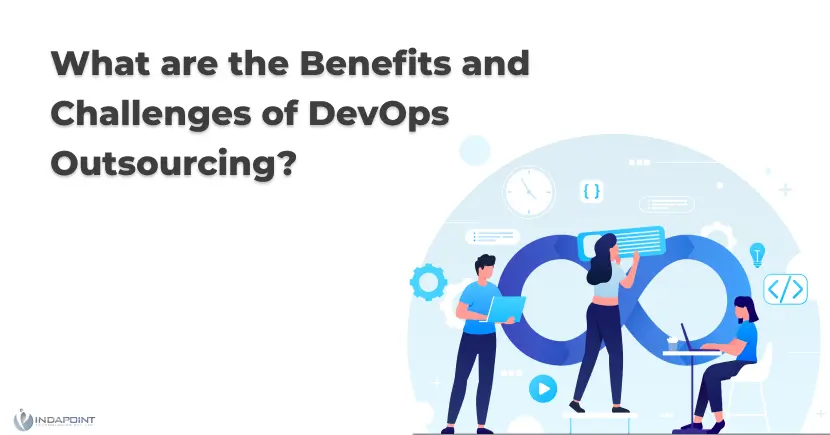What are the Benefits and Challenges of DevOps Outsourcing?
May 25, 2023

DevOps is a difficult concept to implement. DevOps is expensive and requires experts who have vast knowledge. In the Upskilling Report DevOps 2021, 47% of respondents reported experiencing difficulty on their DevOps journey. The challenges are equally spread across people, organizations, processes, and technology.
As reported by 58%, finding and attracting qualified individuals was another huge challenge. Moreover, according to 48% of respondents, the retention and qualification of DevOps experts is also a problem. Do you have similar issues?
Outsourcing DevOps is a great way to overcome the challenges listed above. This blog will teach us about DevOps, its benefits, and companies’ challenges while outsourcing.
What is DevOps outsourcing?
DevOps Outsourcing, also known as DevOps As A Service (DaaS), is when a third-party service provider assumes full responsibility for the design, development, and integration of DevOps for your organization. The outsourcing partner will form a team of experts that work side-by-side with your internal software team to manage day-to-day operations.
The provider can also help you implement other DevOps practices and principles in your organization according to your business goals. This can include automating the DevOps environments, continuous monitoring, and testing.
DevOps Outsourcing can provide organizations instant access to highly skilled resources familiar with DevOps Tools and expertise while saving them the time and money of having in-house DevOps Teams.
DevOps Outsourcing: Benefits
Outsourcing can be an excellent option for your business if you don’t need to build an internal DevOps group. These include:
Maintaining a robust DevOps Team
 Even if you have hired and identified all the DevOps Engineers you want, your fight will continue. Keeping them focused and engaged in the task at hand is challenging. DevOps Teams must be constantly motivated and praised to ensure they operate smoothly and meet their obligations.
Even if you have hired and identified all the DevOps Engineers you want, your fight will continue. Keeping them focused and engaged in the task at hand is challenging. DevOps Teams must be constantly motivated and praised to ensure they operate smoothly and meet their obligations.
You should prepare your business to manage DevOps engineers professionally. Outsourcing companies provide all the necessary facilities to attract engineering “stars.” They also encourage a DevOps-based culture that allows talented engineers to hone and refine their skills.
Reduced Development Cycle
DevOps relies on the collaboration of teams. DevOps providers go beyond outsourcing to ensure cooperation and effective communication. Clients can access helpful information about best practices for software development and avoid starting from scratch. Instead, they will have all the tools they need to implement the DevOps Model.
It saves time and effort with its greater flexibility and simplified development frameworks. This approach allows businesses to launch new products or services when the market changes quickly. Continuous testing, universal automation, and persistent monitoring improve production code quality.
Additional competencies
Outsourcing DevOps also allows you to access specialists like database admins, site reliability engineers, etc. In-house teams may need helping time recruiting specialists with niche or rare competencies. Outsourcing provides additional DevOps skills, allowing you to choose from various DevOps talents to distribute your tasks better and assign specialists to more complex assignments.
Better Quality and Faster Delivery
 DevOps as a Service firms have DevOps culture ingrained in their core functions. Outsourcing to the right vendor will shorten the development cycle and improve the quality of the software. Automation, continuous testing, and constant monitoring enhance the quality of the production code and end product.
DevOps as a Service firms have DevOps culture ingrained in their core functions. Outsourcing to the right vendor will shorten the development cycle and improve the quality of the software. Automation, continuous testing, and constant monitoring enhance the quality of the production code and end product.
Focus on core business
Outsourcing DevOps allows you to access a talent pool of DevOps experts, relieving you of managing and building an internal team. DevOps professionals can also handle the most labor-intensive tasks, thereby improving the quality and delivery of your product.
Technology and risk management
DevOps engineers, Solutions Architects, and other DevOps professionals must constantly experiment to make your design resilient and scalable. This will give your organization a technological and financial advantage. To maintain their skills, they must learn and have fun.
Challenges of DevOps Outsourcing
Outsourcing DevOps has its pros and cons. You should weigh the pros and cons of outsourcing before deciding whether it suits your business. Outsourcing has many advantages, but there are also some challenges. They include:
Restructure Work Culture
DevOps refers to a framework and a culture of engineering. Your in-house engineers must adapt to new working methods if you’re outsourcing DevOps. It is essential to ensure a smooth transition and encourage your employees to allow the DevOps group to work together in-house for optimal results and a fluid working environment.
Takes Time in The Beginning
It takes time to build strong relationships with on-site departments and integrate teams of DevOps Engineers. Realistic expectations are essential when entering the outsourcing process. Being patient when working with new models and creating a collaborative culture with outsourcing companies is necessary.
Look for agencies that prioritize communication and interaction and offer access to experts when you compare offers and meet with representatives. Outsourcing can shorten your development cycle and increase efficiency. However, building relationships and changing the work culture may take some time.
Teamwork is Essential to Success
 For businesses to benefit from DevOps outsourcing, they must be able to adapt and adjust and actively encourage and facilitate teamwork. Both internal teams and agencies must work together to develop and implement a culture that promotes cohesion.
For businesses to benefit from DevOps outsourcing, they must be able to adapt and adjust and actively encourage and facilitate teamwork. Both internal teams and agencies must work together to develop and implement a culture that promotes cohesion.
Teams must communicate freely using tools such as Jira. Github. GitLab. Slack. A solid DevOps Framework should also outline clear engineering goals and explore the benefits and challenges in detail. When selecting a DevOps outsourcer, you must take your time as a business owner. Meet the representatives of DevOps consulting. Discussing goals and targets is a good idea. Read testimonials. Look for agencies that share similar values. Find a service provider that offers a customized service.
Expertise is required
Businesses that lack DevOps expertise can find outsourcing to be highly beneficial. It does, however, require some level of knowledge in software engineering. You need to know what you want from a company and be able to explain it to them. DevOps knowledge is also vital to ensure that you stay on track.
Conclusion
DevOps Engineers are in high demand due to a global shortage of skills and a growing desire to use DevOps Services. DevOps services offer a variety of benefits to companies. However, some challenges need to be considered. It can be expensive to hire DevOps Engineers and difficult to find suitable candidates.
Outsourcing allows you to access talent pools without having to hire new employees. DevOps outsourcing meant increased efficiency, reduced development cycles, improved security, and provided superior flexibility and quality. It can take some time to create a strong team.




